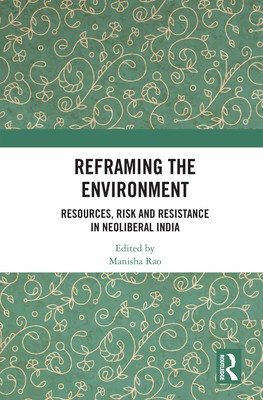
- We will send in 10–14 business days.
- Publisher: Routledge Chapman & Hall
- ISBN-10: 036755318X
- ISBN-13: 9780367553180
- Format: 15.6 x 23.4 x 1.3 cm, softcover
- Language: English
- SAVE -10% with code: EXTRA
Reframing the Environment (e-book) (used book) | bookbook.eu
Reviews
Description
This volume unravels the underlying power relations that are masked in the present discourse of ecological sustainability and conflicts over natural resources. Current discussions on environment emphasise the use and abuse of the environment in various ways. This book looks at the inter-linkages of discourse, resources, risk and resistance in the contemporary neoliberal world. While exploring the experiences of neoliberalisation of nature in India, it brings out the intersections of conservation and management, science and gender, community politics and governance policies.
The volume highlights the cultural politics of resistance from multiple sites and regions in India in the recent context (be it land, water, forest, flora or fauna or urban commons). It discusses the ways in which environmental issues have come up and been appropriated, while examining the role of the State and actors such as corporates, traders, consultants, ecotourism companies, green activists and consumers, and consequences of 'green' appropriation and the 'growth' story. The major themes of the volume are the interrelations of nature, culture and power; neoliberal governance and the environment; access to and use and management of land, natural resources and environment; community politics and livelihoods; marginalised groups and local communities; marketisation and the environment; and new forms of re-appropriation and resistance.
This book will be of great interest to students and researchers in sociology, environmental studies, environmental history, environmental anthropology, political ecology, political science, geography, law and human rights, economics and development studies as well as to environmental activists, policy makers and those in media and journalism.
EXTRA 10 % discount with code: EXTRA
The promotion ends in 18d.03:32:03
The discount code is valid when purchasing from 10 €. Discounts do not stack.
- Publisher: Routledge Chapman & Hall
- ISBN-10: 036755318X
- ISBN-13: 9780367553180
- Format: 15.6 x 23.4 x 1.3 cm, softcover
- Language: English English
This volume unravels the underlying power relations that are masked in the present discourse of ecological sustainability and conflicts over natural resources. Current discussions on environment emphasise the use and abuse of the environment in various ways. This book looks at the inter-linkages of discourse, resources, risk and resistance in the contemporary neoliberal world. While exploring the experiences of neoliberalisation of nature in India, it brings out the intersections of conservation and management, science and gender, community politics and governance policies.
The volume highlights the cultural politics of resistance from multiple sites and regions in India in the recent context (be it land, water, forest, flora or fauna or urban commons). It discusses the ways in which environmental issues have come up and been appropriated, while examining the role of the State and actors such as corporates, traders, consultants, ecotourism companies, green activists and consumers, and consequences of 'green' appropriation and the 'growth' story. The major themes of the volume are the interrelations of nature, culture and power; neoliberal governance and the environment; access to and use and management of land, natural resources and environment; community politics and livelihoods; marginalised groups and local communities; marketisation and the environment; and new forms of re-appropriation and resistance.
This book will be of great interest to students and researchers in sociology, environmental studies, environmental history, environmental anthropology, political ecology, political science, geography, law and human rights, economics and development studies as well as to environmental activists, policy makers and those in media and journalism.


Reviews